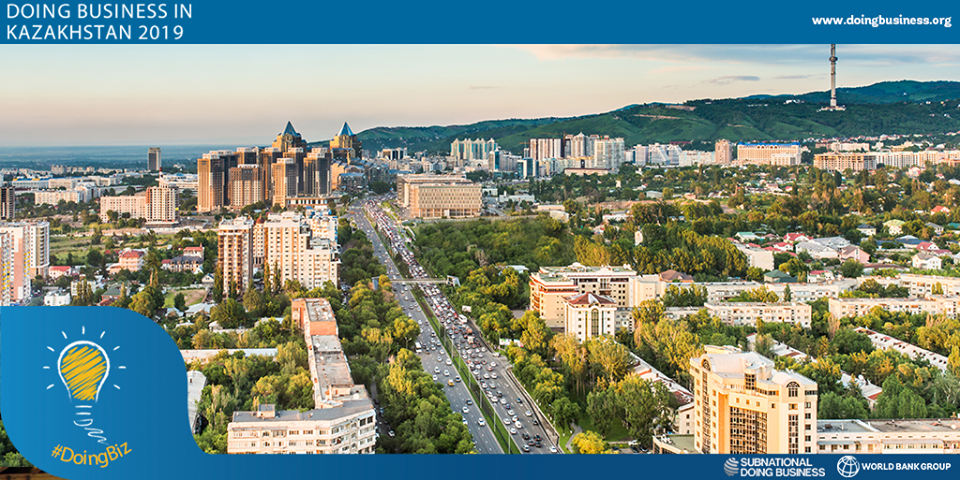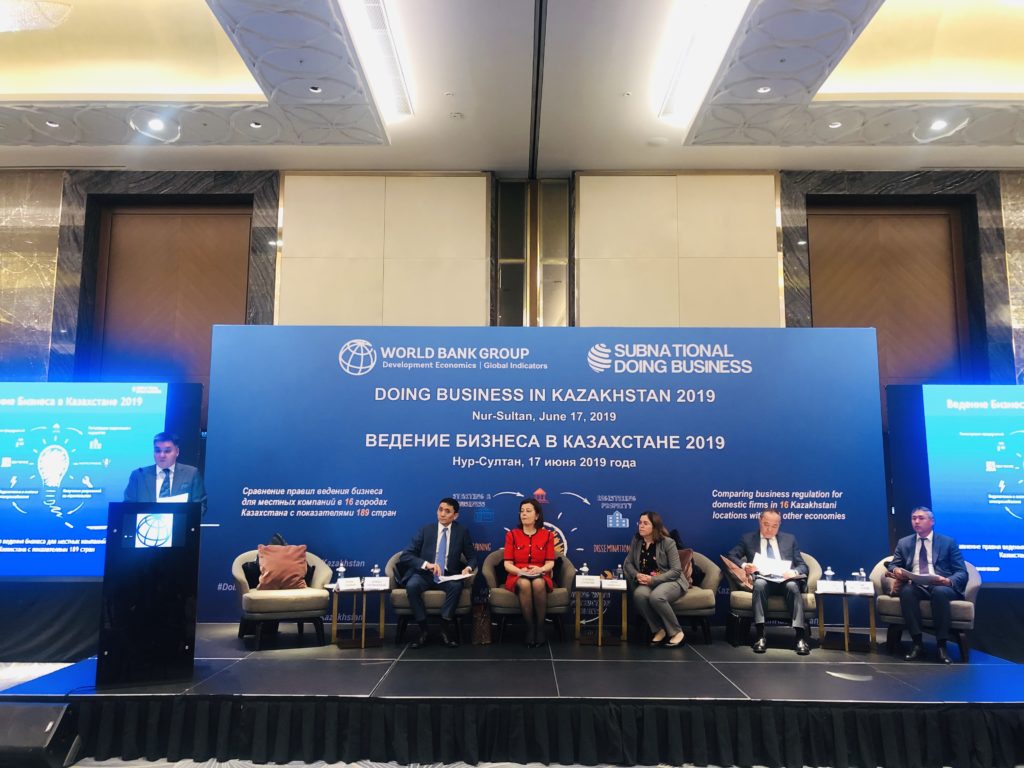The report studied business regulations in four areas – starting a business, dealing with construction permits, getting electricity and registering property – in Akmola (Kokshetau), Aktobe, Atyrau, Almaty (Taldykorgan), East Kazakhstan (Ust-Kamenogorsk), Karaganda, Kostanai, Kyzylorda, Mangistau (Aktau), North Kazakhstan (Petropavlovsk), Pavlodar, West Kazakhstan (Uralsk), Zhambyl (Taraz) regions as well as the three cities of national significance – Almaty, Nur-Sultan and Shymkent.
Vice Minister of National Economy Arman Dzhumabekov said Kazakhstan is adopting unprecedented systemic reforms aimed at improving the business climate and reducing administrative barriers and business costs.
“Since 2014, seven legislative amendments were introduced to the Business Code. As a result, Kazakhstan is among the top 30 countries in the World Bank’s Doing Business ranking and ranks 28th among 190 countries in the world. This is a good achievement. But we need to move forward,” said Dzhumabekov commenting on the report.
Creating a favourable entrepreneurial environment is “a fundamental condition for economic development and the welfare of the country,” said World Bank lead economist Stefka Slavova.
“Local businesses create jobs and generate revenue, which contributes to the development of the country. The governments pay special attention to laws and regulations that affect doing business for small and medium enterprises,” she added.
The World Bank’s Doing Business study allows government regulators to evaluate and compare their activities in maintaining a friendly business environment.
“We’re trying to promote entrepreneurship and job creation in the private sector. The private sector is one of the important engines of growth in any country. Having the right business regulations allows for that. The Subnational Doing Business Report can be used as a diagnostic tool. We measure where business regulations are good or less good within a country. We see this is actually a very powerful message, because often comparing the capital with a capital in another country has a less significant meaning than comparing cities within the same country,” said Rita Ramalho, senior manager of World Bank Global Indicators Group, at the presentation of the report in the capital.
It is easiest to start a business in Nur-Sultan, deal with construction permitting in Almaty and the Kyzylorda region; obtain an electricity connection in Almaty and the Mangistau and Aktobe regions; and register property in the East Kazakhstan and Pavlodar regions and Almaty. On aggregate across the four regulatory areas measured, Almaty has the most business-friendly regulation and Zhambyl the least.
“Almaty on average is the one that performs the best. When it comes to starting a business, it’s ranked number nine. Nur-Sultan is a city that ranks the best in starting a business, but when it comes to the other topics – dealing with construction permits, property and electricity – Almaty is the best one,” she said.
The regions continue to make progress to ease doing business, but there remains room for improvement.
All eight locations featured in the Doing Business in Kazakhstan 2017 survey improved their business environment, with Nur-Sultan advancing the most, the report found. This suggests a countrywide trend toward global good practices, with less red tape for entrepreneurs. Nur-Sultan, which was ranked last in the first study, has adopted multiple reforms since 2016.
“Nur-Sultan was the one that improved the most because it was actually the last one in the previous report. I think that gave a lot of incentive. One of the reforms implemented in Nur-Sultan was in getting electricity and trying to monitor power outages and provide that information on a regular basis. That was part of the significant improvement,” she said.
National reforms related to construction permitting have had positive results. The time for getting construction permits decreased due to strict oversight by the Government for Citizens state corporation that operates as a one-stop shop for more than 750 public services… In 2016 the difference in time between Almaty as the best performer on dealing with construction permits and the worst, Shymkent, was 82 days. That gap has now closed by more than half, to 39 days.
“There were some reforms at the national level. Some cities benefited more because the implementation may have varied across the different cities. But, for instance, in starting a business, one of the things that happen across the country was the e-government portal for VAT registration. It simplified the process of starting a business across the country. In getting electricity, there was the elimination of the requirement to obtain an expert opinion after external work,” she said.
“When it comes to the time and cost of doing business and the pace of improvements compared to Europe and Central Asia (ECA) economies and the Organization for Economic Co-operation and Development (OECD) high-income economies, Kazakhstan does quite well,” she said.
It costs 46.7% of income per capita to obtain electricity in Kazakhstan, less than 15% of the average in all ECA economies.
Kazakhstan has more room for improvement compared to those two groups in terms of the number of processes required to start and run a business. Procedural complexity remains a challenge.
“There is a higher number of procedures in Kazakhstan on average both for starting business, getting electricity and construction permitting,” she said.
Entrepreneurs need a lot of clearances and approvals before and after construction. While it takes an average of 13 procedures to deal with construction permits in OECD high-income economies and 16 in ECA economies, it takes 18 procedures in Kazakhstan. In Almaty, where the process is the least cumbersome, entrepreneurs still have to fulfil 17 requirements to obtain a construction permit.
“The variability within Kazakhstan could be used in your favour. If you apply the best practices that you have within Kazakhstan, there would be significant improvement for Kazakhstan itself,” she said.
If Almaty, which represents Kazakhstan in the global Doing Business report, provided an electricity connection as quickly as Petropavlovsk (46 days) and at the same cost as Kyzylorda (27.9% of income per capita) Kazakhstan’s global ranking on getting electricity would jump 36 spots, from 76 to 40, all else being equal.
“There is significant improvement that you can have just by using the knowledge that you already have in the good practices that are already applied in the country. [This also applies to] dealing with construction permits, where there is also significant room for improvement. In other topics, the improvement is less significant just because the variability is smaller. But then this could also mean that overall, Kazakhstan would be, instead of being top 30, will become top 25 if there was that improvement of just choosing the best practice within Kazakhstan,” she said.


































